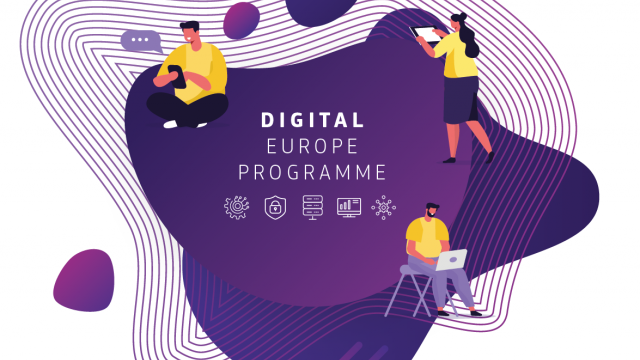Objectives and goals of the funding programme
The Digital Europe Programme will provide strategic funding to answer these challenges, supporting projects in five key capacity areas: supercomputing, artificial intelligence, cybersecurity, advanced digital skills, and ensuring a wide use of digital technologies across the economy and society, including through Digital Innovation Hubs.
It aims to accelerate the economic recovery and shape the digital transformation of Europe’s society and economy, bringing benefits to everyone, but in particular to small and medium-sized enterprises.
Its goal is to support the strategic autonomy of the EU’s single market.
Type of Programme
Digital Europe Programme
Funding type/type of support
Financing (Loans/Guarantees)
Organizational level
International
Programme Focus
Competitiveness, research and innovation, Skills, Smart / digital tourism
Programme relevant for/ target group
SMEs and micro companies, VET Providers, Other
Geographic area
European Union
The work programme distributes its 2023 budget of €392 million (in current prices) by allocating:
- €113 million to support the deployment of common data spaces (including sectorial data spaces) and support cloud-to-edge infrastructure and services. This includes implementing the AI work-strand, with sectorial testing and experimentation facilities.
- €58 million for actions on advanced digital skills in key capacity areas through specialized education programmes and other actions.
- €60 million to support the Destination Earth initiative, including the core platform, data lake, and related digital twins.
- €86,8 million for deploying digital technologies, such as the European Blockchain Services Infrastructure (EBSI). This also includes sectorial IT solutions for justice and consumers, building confidence in digital transformation and solution deployment for public services, and supporting Trans-European Services for Telematics between Administrations (TESTA).
- €10 million for a strategic digital technologies investment platform.
- €22.7 million for supporting other programmes, including the Digital Services Act and Digital Markets Act IT systems. Assistance will also be provided for operating and updating the IT system for the EU Digital COVID Certificate standards and its specifications. Most of the programme’s activities require co-investments from the public and private sectors.
The Digital Europe Programme (DIGITAL) is open to a diverse range of entities. Eligible applicants include Small and Medium-sized Enterprises (SMEs), Large Enterprises, Government bodies, Cities, Communities, Non-Governmental Organizations (NGOs), and Knowledge Centers.
€2.2 BILLION for supercomputing to:
Build up and strengthen the EU’s supercomputing and data processing capacities by buying world- class exascale supercomputers by 2022/2023 and post exascale facilities by 2026/2027.
Increase accessibility and broaden the use of supercomputing in areas of public interest such as health, environment and security, and in industry, including small and medium-sized enterprises.
€2.1 BILLION for artificial intelligence to:
Invest in and open up the use of artificial intelligence by businesses and public administrations.
Set up a true European data space and facilitate safe access to and storage of large datasets and trustworthy and energy efficient cloud infrastructure.
Strengthen and support existing artificial intelligence testing and experimentation facilities in areas such as health and mobility in Member States and encourage their cooperation.
€1.6 BILLION for cybersecurity to:
Strengthening cybersecurity coordination between Member States tools and data infrastructures.
Support the wide deployment of the cybersecurity capacities across the economy.
€580 MILLION for advanced digital skills to:
Support the design and delivery of specialized programmes and traineeships for the future experts in key capacity areas like data and AI, cybersecurity, quantum and HPC.
Support the upskilling of the existing workforce through short trainings reflecting the latest developments in key capacity areas.
€1.1 BILLION for ensuring the wide use of digital technologies across the economy and society to:
Support high impact deployments in areas of public interest, such as health (complemented by EU4Health programme), Green Deal, smart communities and the cultural sector.
Build up and strengthen the network of European Digital Innovation Hubs, aiming to have a Hub in every region, to help companies benefit from digital opportunities.
Support the uptake of advanced digital and related technologies by the industry, notably small and medium-sized enterprises.
Support European public administrations and industry to deploy and access state of-the-art digital technologies (such as blockchain) and build trust in the digital transformation.
This programme supports the creation of data spaces, with three projects being particularly interesting for the tourism sector.
- Two coordination and support actions explore the governance of a future data space for tourism
- The European common data space for cultural heritage supports the digital transformation of Europe’s cultural heritage sector.
- The data space for mobility is key to tourism. So is interoperability. The data spaces for tourism, mobility, cultural heritage and others need to be interoperable.
Moreover, SMEs in the tourism sector can be supported by the network of European digital innovation hubs in their digital transformation.
The Digital Europe programme reinforces critical digital capacities by focusing on the key areas of artificial intelligence (AI), cybersecurity, advanced computing, data infrastructure, and governance and processing. It also assists their deployment and best use in sectors like energy and the environment, manufacturing, agriculture and health. The programme provides strategic support for the digital transformation of the EU industrial ecosystems.
- Project Title: DATES – European Tourism Data Space
This project explores approaches and options for deploying a secure and trusted tourism data space to ensure transparent control of data access, use and re-use.
Dates focuses on developing governance and business models. It recommends clear strategies on how to inspire and motivate all key tourism stakeholders to collaboratively build a powerful, interconnected tourism data space. This project is part of the preparatory work for the European Data Space for Tourism.
- Project Title: Data Space for Tourism
The Data Space for Tourism shall enable all sector stakeholder groups (e.g. SMEs, governmental agencies, technology firms, and tourism entities at a national, regional, and local level) to share and access the data they require when they need it. This project is part of the preparatory work for the European Data Space for Tourism.
Total budget: €1.7 million
